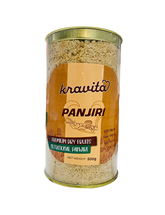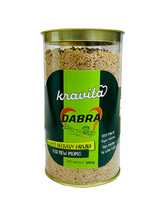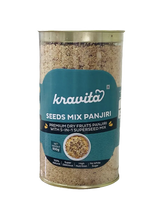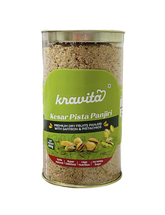When it comes to introducing solid foods to your little one who has just managed to show the early signs of being prepared for it, you are right to feel worried and be extra careful about what you expose your baby to. Babies and their bodies are unfamiliar with solid food items, which can either be digested by them successfully or respond unexpectedly to certain substances present in them.
As a mother, one of the most important aspects of nurturing our little ones is ensuring they receive proper nutrition to support their growth and development. Introducing solid foods into a baby's diet is a significant milestone, and it's essential to make informed & perfect choices, especially when it comes to introducing foods like nuts. Let's explore the benefits, considerations, and safe practices for introducing nuts to your baby's diet.
In general, Nuts are a good source of fat, which is important for growth and development. They are tasty foods that help us feel satisfied when we eat them.
Nutritional Benefits of Nuts for Infants
The variety of nuts that are available to us is just a simple sign of many nutritional benefits their inclusion in the diet can provide to the infants. Most of these are extremely essential to support their initial phases of development.
- Many nuts such as peanuts and pistachios tend to contain resveratrol. This helps in supporting the development of their immune system.
- Including nuts regularly in a child’s diet helps support his brain function and development.
- Nuts usually contain unsaturated fats. These fats are highly beneficial for the body, as compared to other kinds of fat.
- For families that are primarily vegetarian, nuts provide the necessary amount of protein that the baby’s body would usually need.
- Nuts also contain enough fibrous elements within it, which can help take care of any bouts of constipation and stimulate digestion in a baby.
- Some nuts also contain phosphorus in good amounts. This plays a key role in developing the teeth and bones in young babies effectively.
- Walnuts are known to be a rich reserve of omega-3 acids, which are highly essential in maintaining good health and proper blood circulation.
- The presence of vitamin E, flavonoids, and various antioxidants in a bunch of nuts make sure that the waste material inside the baby’s body is flushed out effectively.
Cashews are also a good source of omega fats, as well as copper (which is essential for iron absorption), magnesium, and amino acids that power cell growth.
Meanwhile, almonds are a great source of fiber, plant-based protein, and monounsaturated fats (the same kind of heart-healthy fats found in other superfoods, like avocado and olive oil). They’re also high in other vitamins and minerals, including calcium, iron, folate (which is great for metabolism), vitamin E, zinc (a powerful antioxidant)
Nuts with these nutritional benefits protect your child’s heart, support their metabolism, and help with brain development.
When Can You Give Nuts to Your Baby?
Knowing the right time to introduce nuts to your baby is extremely necessary, be it a single peanut or an entire platter of various nuts that are being procured. Furthermore, no medical study or research has arrived at a conclusive age or period that can be supposed to be ideal to let a baby try out nuts for the first time. The presence of nut-based allergies is common, which can further make your decision a bit uncertain. However, it is a good practice to let your baby get used to other solid food items initially and then introduce nuts in their diet. You could start giving your baby nuts as early as 9-10 months of age.
How to Introduce Nuts to Babies
Once your little one begins to show some interest in taking solid foods, you can slowly start prepping them to develop a taste for nuts. While we may eat nuts wholly, some of them could cause your little ones to choke on them. Therefore, crushing the nuts in a powdered form could be a great way to add the nuts in your child’s diet.
Smart Ways to Include Nuts in a Baby’s Diet
Nuts are pretty easy to mix into your baby’s food. Here are some easy ideas and recipes:
One of the easiest ways to include nuts in the diet of your little one is by making use of nuts powder for babies. This powder can be introduced in various baby food preparations in multiple ways, such as:
- Adding the powder to the mix used to make cookies and laddoos.
- Mixing the powder with the dough used to make parantha.
- Any mashed preparations for the baby that can have a better taste with nuts.
- Mixing a little proportion of the powder with milk to increase its nutritional value substantially.
- You can spread almond or cashew nut or peanut butter on toast and give it to your child.
There are lots of options. You can try giving your baby peanut puffs that are kind of like peanut cheetos and dissolve easily when your baby sucks on them. They can also be dissolved into your baby’s other foods, including breast milk.
You can use nut powders and sprinkle them into your baby’s food, or you can bake with nut flours.
Nut butters (like peanut butter or almond butter) are great too, but it’s important to introduce them safely. Because nut butters can be very thick and sticky, large globs could be choking hazards.
However, when you introduce them, just make sure you start with a small amount (roughly 1/4 tsp or less) until you know how your baby will react.
The benefits of nuts are quite extensive and the flavour that they bring by their inclusion in certain dishes is quite remarkable. By maintaining a level of precaution and introducing nuts only after your baby is ready to eat them, you can make sure they are safe for him and, consequently, widen his preferred food choices.
How do I know if I’m buying the right kind of nut products for my baby?
A mother always wants the best for their child so you can go for the best option. At Kravita, we bring the best Kravita homemade cereal for your baby that not just includes desi cow ghee, healthy cereals like wheat, oats, ragi but also includes age appropriate and season appropriate nuts to easily include in your baby’s diet. Made with natural sweetener, this instant baby cereal mix is the most healthy, tasty travel, home, and school snack for your little ones.
You may also opt for healthy and delicious little ladoos for toddlers and kids. Made with healthy cereals, desi cow ghee, dates, jaggery, almonds, makhana. No Sugar. No Preservatives. Great for weight gain. Just like you would put that extra love to your dishes for your child, we put in our love and care to bring to you these ladoos that taste just like home with loads of nutrition!
Whenever you plan to introduce a solid food to your child for the first time, we recommend picking a time and day that allows for you to closely monitor your child for up to 6 hours for signs and symptoms of an allergic reaction.
It requires careful consideration for their nutrition and safety. While nuts offer numerous benefits, including supporting brain development and digestion, cautious introduction is necessary to avoid choking hazards and allergies. Opting for crushed or powdered forms and selecting high-quality products like Kravita's ensures safe consumption. With its blend of super healthy ingredients, free from any additives or preservatives, Kravita provides a nutritious and delicious snack for little ones. By making informed choices and prioritizing their well-being, parents can help their children thrive in their growth and development journey.














